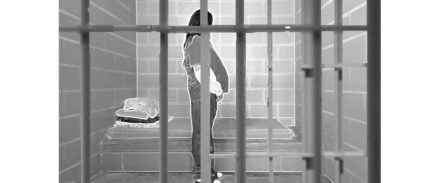
In the latest twist in an ongoing legal battle between the Department of Correction and a woman who gave birth in her prison cell last year, lawyers for the state have opened a line of inquiry that is raising concern among her advocates.
The request for admissions, a standard filing in a federal court case, began with a series of conventional, yes-or-no-style questions:
“Admit that you were a sentenced offender at York Correctional Institution on Feb. 13, 2018.”
“Admit that, on Feb. 10, 2018, you did not know the day when you would give birth to your daughter.”
“Admit that you received an inmate handbook after your admission to York CI and prior to the birth of your daughter.”
But the queries posed to Tianna Laboy, who at 19 delivered her first child on the toilet in her locked cell, became increasingly combative.
“Admit that you could have given birth to your baby on your bed.”
“Admit that no one took your baby from you while you were together at York CI.”
“Admit that you were not restrained during your transport to the hospital.”
“Admit that you did not seek any prenatal care prior to your incarceration at York CI.”
“Admit that your baby was never an inmate.”
The assertions, outlined in recently filed court papers, are part of a civil case brought in March by Laboy and her mother, New Britain resident Karine Laboy, who now has custody of her daughter’s baby. The women have accused the Department of Correction, former commissioner Scott Semple, and several employees of denying and delaying medical care.
The case drew considerable attention when DOC officials disclosed in February 2018, just days after the birth, that an inmate had delivered a baby in a cell. A DOC spokesman said two employees were walked off the site and told not to return, and an internal investigation was launched into the circumstances surrounding the incident.
Seventeen months later, the review is still underway, and DOC officials have denied a Freedom of Information request from the CT Mirror for a report on the episode completed by one of their own workers.
As the court case has churned along, women’s health advocates and Laboy’s mother expressed frustration over the recent filing, saying the questions directed at Tianna Laboy were aggressive and unfair.
“Tianna deserved to be treated with dignity and she wasn’t,” said Gretchen Raffa, director of public policy and advocacy for Planned Parenthood of Southern New England. “She’s owed answers as to why she did not receive the health care and treatment she should have, not questions that attempt to blame her for the unfair treatment and neglect of the state.”
Raffa called on the DOC to “be more transparent” about the circumstances of the birth.

“The system failed her and denied her the basic human right to health care … which she deserves whether she’s incarcerated or not,” Raffa said. “She was forced to deliver her baby under some of the most difficult circumstances and dangerous circumstances imaginable.”
Lawyers for the State Attorney General’s office, who are handling the case on behalf of the DOC, declined to comment on the request for admissions.
DeVaughn Ward and Kenneth Krayeske, Laboy’s lawyers, also declined comment, saying they feared sanctions from the attorney general’s office.
Karine Laboy called the questions aimed at Tianna “outrageous” and said the agency was attempting to deflect responsibility.
During phone calls immediately predating the birth, Tianna complained to her mother that she wasn’t receiving medical care, Karine said.
“They’re asking my daughter to admit certain things, but they did not admit that they did wrong and they neglected her,” she said. “She never should have been in her cell that morning. It’s ridiculous.”
Sarah Grady, an Illinois attorney who has represented numerous inmates in health care-related lawsuits, including women who have given birth in prison, said the court filing in Laboy’s case is not all that unusual.
“It is fairly common that in admissions requests they are trying to sort out issues and trying to get something they can introduce at trial,” she said. “They’re usually very aggressive.”
But in their quest for answers, Grady said, attorneys can dehumanize the opposition.
“Defense lawyers in these cases often are taught to view these women as something less than human,” Grady said. “They’re inmates. And so it’s – ‘Oh, we have to deal with this inmate issue,’ as opposed to, ‘We have to deal with this poor mother who is forced to give birth in the confines of a jail cell or a prison cell.’”
“There’s a way to treat that person as a human even while defending against the case,” she said. “But I just don’t think that happens.”
It was unclear if Ward and Krayeske have issued a response to the query. Laboy was asked 65 questions as part of the filing. Questions posed in a request for admissions are automatically deemed ‘admitted’ in federal court if the target of the inquiry fails to timely respond or object.
The state also sought $500 each from Tianna and Karine Laboy as a security measure in the event that they are not successful in the litigation. The money would have been used to cover attorney’s fees and other costs associated with defending the case.
Ward and Krayeske objected, saying neither woman had the means to pay. Tianna is still incarcerated and her mother relies on public assistance.
A judge sided with the plaintiffs.





